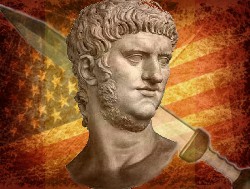Is Islam a Religion?
 I’m a long time veteran of the intra-conservative interventionism vs. non-interventionism debate. I was a non-interventionist before Ron Paul made non-interventionism cool. So I have seen all the recycled arguments over and over and over and over … I say this not so as to debate interventionism vs. non-interventionism here. That is not the purpose of this essay. I say it to provide background as to what brings up the real subject of this essay.
I’m a long time veteran of the intra-conservative interventionism vs. non-interventionism debate. I was a non-interventionist before Ron Paul made non-interventionism cool. So I have seen all the recycled arguments over and over and over and over … I say this not so as to debate interventionism vs. non-interventionism here. That is not the purpose of this essay. I say it to provide background as to what brings up the real subject of this essay.
As a veteran of these debates I have seen all the arguments, but one that I have seen increasingly recently is the contention that Islam is not a religion. The idea being that Islam is not “just” a religion but is instead an all-encompassing political ideology that impacts government, law, education, social organization and convention, etc. of which religion is only a part. The more maximalist proponents of this theory will add that establishment of a world Caliphate, domination of those who refuse to go along, intolerance of other religions, etc. is an inherent part of Islam. This “Islam is not a religion” argument is often seen in conjunction with concerns about the imposition of Sharia law at home.
While seldom directly stated, the implication of this line of reasoning is that Islam cannot be treated as simply another religion deserving of tolerance but must be treated as an alien ideology that threatens the very American way of life. (As I will illustrate below, this is a curious line of reasoning. Essentially the argument is that Islam is dangerous because it is illiberal and thus requires an illiberal response.) This argument seems mostly to imply that Islam is a potential problem domestically within our shores, but given that the argument is usually made within the context of debates over foreign policy, it usually has unstated but implied foreign policy implications as well; namely that since Islam is inherently aggressive and bent on world domination, it must be met with an aggressive and forward military response.
Actually, I do believe that there is much truth to the contention that Islam is a broadly encompassing worldview, but the facts of that are not what are in contention here. The issue is whether Islam’s ideological breadth disqualifies it from being a religion. I have two problems with this line of reasoning, the first semantic and the second much more profound.
Discussion
Washington Wants a Say Over Your Minister
Body
Discussion
Calif. Student Punished for Saying "Bless You"
Body
Discussion
Would You Vote for a Mormon for President? (A Second Look)
 The essay below first appeared in September of 2007 in anticipation of the ‘08 election. This version is updated for 2011.
The essay below first appeared in September of 2007 in anticipation of the ‘08 election. This version is updated for 2011.
Would you vote for a Mormon for President? Under the right conditions, I would.
By now, the name Mitt Romney is at least vaguely familiar to most of us. Romney, the former governor of Massachusetts, is running for President and is a Mormon. So far, his fund-raising efforts have been fruitful, and the discomfort of many Republicans with the alternatives has kept Romney in a strong position in the polls. Though his chances of being the Republican nominee are smaller now that Rick Perry has entered the race, an eventual Romney nomination is far from impossible.
Some pundits claim the Christian Right will never allow that to happen. In their view, evangelicals view Mormonism as a cult and anyone associated with Mormonism as an embodiment of evil. One pundit, who happens to be a Mormon, wrote the following:
Everyone knows that Christian evangelicals hate Mormons so badly that if they had to choose between a bribe-taking, FBI-file-stealing, relentless-lie-telling, mud-slinging former first lady, and a Mormon ex-governor who doesn’t lie, who’s still married to his first wife, and who supports the entire Christian evangelical agenda, they’d still rather die than vote for a Mormon.
Is he right? More importantly, should he be right? I for one would vote for the Mormon Romney over any liberal Democrat likely to seek office, and I’d do so with only brief hesitation. Before you brand me a nutcase or a heretic, consider the following factors behind my thinking.
Discussion
"Obama is 'ramping up his God talk'"
Discussion
Romney "has held the offices of Mormon Missionary, Missionary Zone Leader, assistant to the Mission President... Bishop and Stake President over approximately 12 churches"
Body
Discussion
Rome, Rulers and Respect: The Historical Context of Romans 13

First and second century Roman historians provide a window through which to see the context of the Roman Christians in the time surrounding Paul’s letter to them. These historians’ accounts of the life and times in Rome are second-hand. When Paul wrote Romans, historians Suetonius and Dio Cassius had not yet been born, and Tacitus was two or three years old. Of these three, Tacitus, who was a close friend of Pliny the Younger, lived closest to the time of the events surrounding the book of Romans, and his accounting of that time period is the most detailed. Tacitus wrote, “I do but relate what I have heard and what our fathers have recorded.” The works of Suetonius (Lives of the Twelve Caesars) and Dio (Roman History) both corroborate and complement that of Tacitus (The Annals).
While it is difficult to pinpoint the beginning of Christianity in Rome, it is known that “visitors from Rome” were at Pentecost (Acts 2:10), Romans were converted to Christianity before Paul’s conversion (Rom. 16:7), Christians (namely, Aquila and Priscilla) lived in Rome during the reign of Claudius (Acts 18:2), and reports of the faith of Christians in Rome had already spread “in all the world” by the time Paul wrote to them (Rom. 1:8). These factors make the presence of Christianity in Rome likely from the mid to late 30s on into the reign of Claudius. The year AD 47 was about ten years before Paul wrote Romans and ten-plus years after his conversion. It is the year in which the following narrative begins.
The reign of Claudius and the rise of Nero
When Claudius was in the seventh year of his reign over the Roman Empire, his wife, Messalina, was at the height of her power. Many murders were committed at her bidding, and she forced others to commit suicide—sometimes only to quell her jealousy. As Messalina’s hate increased against Claudius’ niece, Agrippina, she was overcome with desire for another man and began an adulterous relationship with him. About a year later, when Claudius was away at the harbor city of Ostia, Messalina married the man with whom she was having an affair.

Discussion